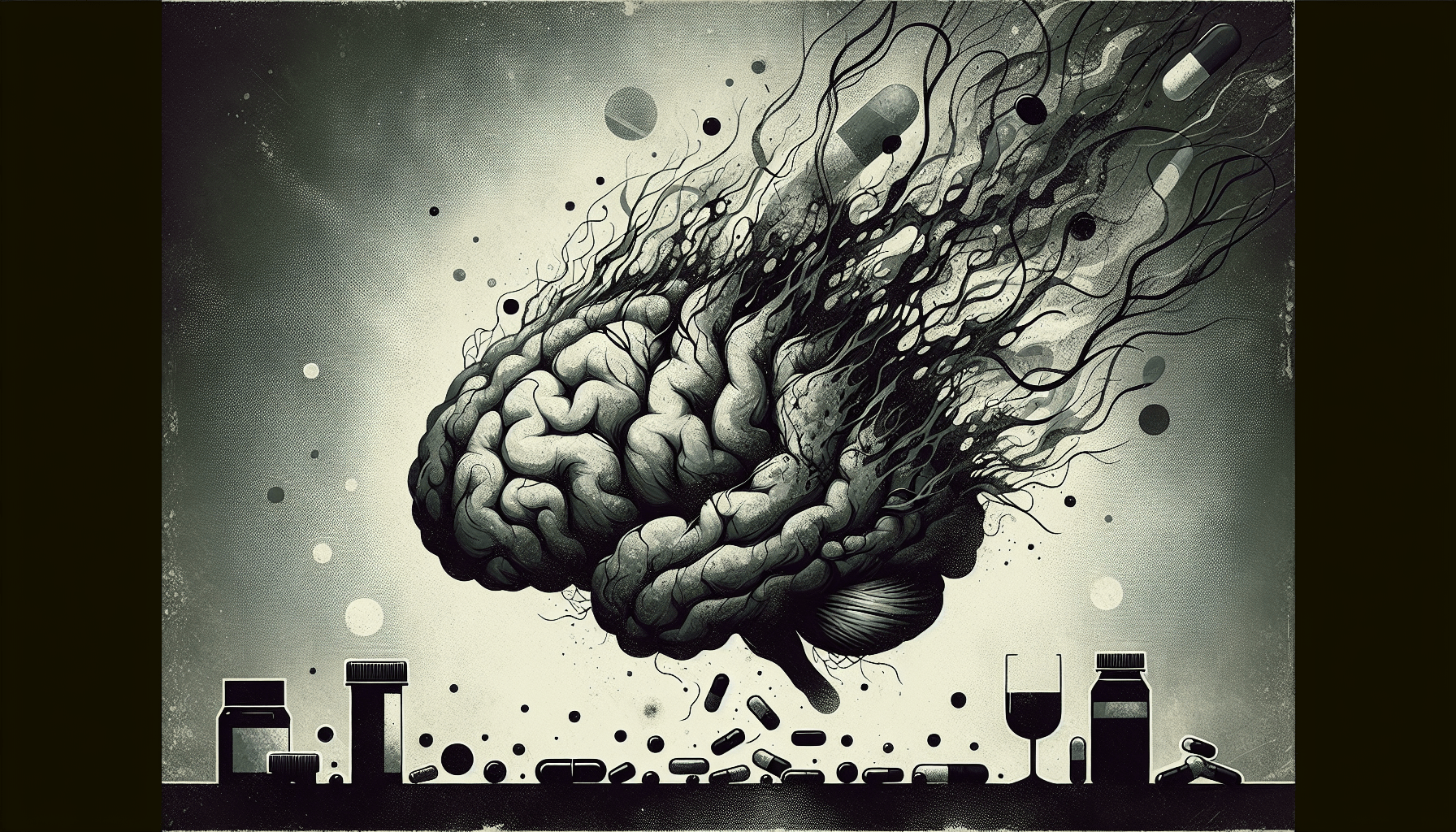Have you ever wondered what happens to your brain when substance abuse becomes a part of your life? Understanding the relationship between substance abuse and cognitive function can open doors to awareness and proactive change.
Understanding Cognitive Function
Cognitive function encompasses a range of mental processes that include memory, learning, attention, problem-solving, language skills, perception, and overall intellect. These functions are crucial for your daily tasks, problem-solving abilities, and capacity to learn and adapt to new environments.
Basic Cognitive Processes
Your brain's cognitive functions are divided into several key areas:
- Memory: Allows you to retain and recall experiences and knowledge.
- Attention: Enables you to focus on specific stimuli or activities.
- Language: Helps you understand and communicate through spoken and written words.
- Executive Function: Governs planning, decision-making, and self-control.
- Perception: Lets you interpret sensory information from the world around you.
Now, imagine the impact if these functions are compromised. Substance abuse can lead to such consequences, disrupting your daily life and long-term potential.
Substance Abuse and Its Nature
Substance abuse involves the harmful or hazardous use of psychoactive substances, including alcohol and illicit drugs. It's defined not just by the frequency or the quantity of use, but the consequences it has on your life—social, professional, and personal disruptions are common indicators.
Commonly Abused Substances
Several substances have been identified as having a substantial impact on cognitive processes:
- Alcohol: Often consumed socially, but abuse can impair almost every aspect of cognitive functioning.
- Cannabis: Impacts memory, attention, and decision-making skills.
- Opioids: Can lead to significant cognitive deficits, especially regarding alertness and memory.
- Stimulants (e.g., cocaine, methamphetamine): Initially increase alertness, but chronic use leads to cognitive decline.
Understanding how each of these substances affects your cognitive functions is crucial in realizing the broader implications of substance abuse on your life.
How Alcohol Affects Cognitive Function
Alcohol consumption in moderation might not lead to long-term cognitive impairments for everybody. However, excessive and chronic use can have severe impacts on your brain.
Short-term Effects
Immediately after consumption, even small amounts of alcohol can affect your brain, reducing your ability to perform demanding tasks due to reduced attention and reaction times. In the short-term, you might notice:
- Impaired Judgment: Difficulty making sound decisions or recognizing mistakes.
- Decreased Inhibition: Making risky choices without thoroughly considering the consequences.
Long-term Effects
Over time, excessive alcohol consumption can lead to more severe and lasting cognitive impairments, including:
- Wernicke-Korsakoff Syndrome: Often referred to as “wet brain,” this syndrome results from thiamine (vitamin B1) deficiency and leads to severe memory problems.
- Reduced Brain Volume: Consistent alcohol abuse can lead to brain shrinkage, particularly affecting the frontal cortex, critical for voluntary movement, decision-making, and problem-solving.
- Memory Impairments: Long-term memory, especially, can be significantly impacted, making it harder for you to form new memories or retrieve existing ones.
Table: Effects of Alcohol on Cognitive Function
| Cognitive Aspect | Short-term Effects | Long-term Effects |
|---|---|---|
| Judgment | Impaired | Persistent decision-making challenges |
| Memory | Short-term forgetfulness | Severe memory loss |
| Brain Structure | Temporary impairment in function | Brain volume reduction |
Drug Abuse and Cognitive Consequences
Unlike alcohol, the impact of drug abuse can vary significantly based on the type of drug consumed. However, regardless of the substance, prolonged abuse almost invariably hampers cognitive function.
Cannabis and Your Brain
While some legal debates and discussions revolve around its use, chronic cannabis consumption can still detrimentally affect cognition:
- Memory: Short-term memory can diminish, affecting your ability to learn new information.
- Attention: Tasks requiring prolonged attention can become challenging.
- IQ Reduction: Some studies suggest a potential irreversible drop in IQ, especially if cannabis use begins in adolescence.
Opioid Effects
Opioids, often prescribed for pain but widely abused, can lead to significant cognitive declines due most prominently to:
- Impaired Alertness and Reaction Time: Ability to respond to stimuli is significantly delayed.
- Memory Loss: Both short and long-term memory are negatively affected.
- Attention Deficits: Sustained focus becomes challenging, impacting personal and professional life.
Stimulants' Impact
Drugs such as cocaine and methamphetamine are known for their powerful and sometimes devastating effects:
- Frontal Lobe Dysfunction: Frequent use can affect the frontal lobe, impairing judgment and increasing impulsivity.
- Memory and Learning Deficits: Harder to acquire new information or recall existing knowledge.
- Increased Risk of Neurological Disorders: Continuous use can increase the risk of disorders such as Parkinson's disease.
Table: Drug-Specific Effects on Cognitive Function
| Substance | Specific Cognitive Effects |
|---|---|
| Cannabis | Decreased short-term memory, reduced attention, possible IQ loss |
| Opioids | Impaired alertness, memory loss, attention deficits |
| Stimulants | Frontal lobe dysfunction, memory deficits, neurological risk |

Neurobiological Mechanisms Behind Cognitive Impairment
Understanding the biological pathways through which substance abuse affects brain function can clarify the extent of its impact.
Brain Structures and Pathways
Various brain structures interact in cognitive processes, each susceptible to substance abuse damage:
- Hippocampus: Essential in forming new memories. Alcohol and cannabis are known to impair this region.
- Prefrontal Cortex: Critical for decision-making and self-control, heavily influenced by alcohol and stimulants.
- Basal Ganglia: Involved in habit formation and reward, impacted by prolonged drug abuse.
Neurotransmitter Disruption
Substance abuse often distorts the balance of neurotransmitters:
- Dopamine: Excessive opioid and stimulant use can lead to a significant imbalance, reciprocal to emotional and reward responses.
- GABA and Glutamate: Alcohol alters these neurotransmitters, leading to sluggishness and poor memory.
- Serotonin: Affected by substances like MDMA, contributing to mood disorders and cognitive dissonance.
Your cognitive capabilities are closely tied to the neural circuits and neurotransmitter systems in your brain. Once these are destabilized due to substance abuse, the resulting cognitive impairments can have both short and long-term effects.
Psychological Impact and Social Implications
Substance abuse doesn't just affect the brain's cognitive functions in isolation; it also creates a ripple effect on psychological well-being and social stability.
Mental Health Concerns
Substance abuse commonly co-occurs with mental health disorders, such as:
- Depression and Anxiety: Cognitive decline often exacerbates these issues by impairing problem-solving abilities and emotional regulation.
- Social Withdrawal: Cognitive impairments and mood disorders can push you away from important support systems, isolating you further.
Impact on Relationships and Productivity
The cognitive impairments caused by substance abuse can strain personal and professional relationships, due to:
- Communication Barriers: Difficulty in expressing thoughts clearly and understanding verbal cues.
- Decreased Work Performance: Challenges in meeting professional responsibilities due to memory lapses and poor judgment.
Table: Social Implications of Substance Abuse
| Life Aspect | Impact Due to Cognitive Impairment |
|---|---|
| Relationships | Communication difficulties, social withdrawal |
| Employment | Decreased productivity, potential job loss |
| Education | Lower grades, difficulties in learning new skills |
Understanding these broader impacts highlights the importance of addressing substance abuse with urgency and empathy.
Prevention and Recovery
Fortunately, awareness of the potential cognitive impacts of substance abuse can lead to proactive prevention strategies and effective recovery plans.
Prevention Strategies
- Education and Awareness: Informing yourself and others about the risks of substance abuse is a powerful preventive tool.
- Healthy Coping Mechanisms: Finding stress-relief methods that don't involve substances can sustain your cognitive and emotional health.
- Community Support: Engaging in support groups offers a network that fosters sobriety and cognitive resilience.
Recovery and Treatment
Recovery from cognitive impairment due to substance abuse involves structured treatment plans, which may include:
- Cognitive Behavioral Therapy (CBT): Helps reshape your thinking patterns and improve decision-making skills.
- Neurofeedback: Offers stimulating exercises aiming to repair cognitive function.
- Medication: In certain cases, medication may aid in balancing neurotransmitter levels.
The journey to recovery requires time and commitment, but the cognitive improvements and enhanced quality of life make it immensely worthwhile.
Final Thoughts
Recognizing the profound impact of substance abuse on cognitive function highlights the critical necessity for both individual and communal responsibility toward better mental and cognitive health. The consequences stretch beyond just the individual, affecting families, workplaces, and the larger community. Therefore, it's vital to remain informed, seek help when needed, and advocate for environments that foster healthy and balanced lives. Embracing the potential for change is the first stride towards a future fortified with cognitive clarity and overall well-being.




